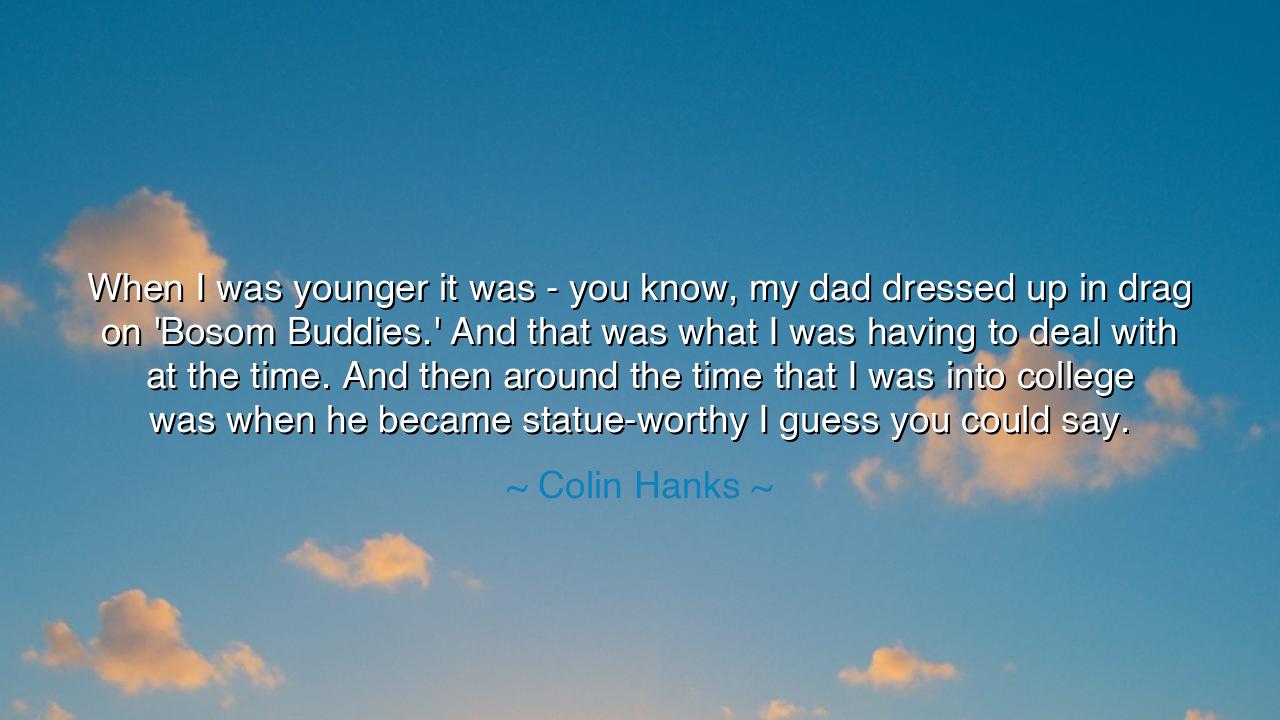
When I was younger it was - you know, my dad dressed up in drag
When I was younger it was - you know, my dad dressed up in drag on 'Bosom Buddies.' And that was what I was having to deal with at the time. And then around the time that I was into college was when he became statue-worthy I guess you could say.






“When I was younger it was — you know, my dad dressed up in drag on Bosom Buddies. And that was what I was having to deal with at the time. And then around the time that I was into college was when he became statue-worthy I guess you could say.” — Colin Hanks
In these lighthearted yet deeply revealing words, Colin Hanks, son of the legendary actor Tom Hanks, speaks of the strange passage from childhood to maturity — not merely in years, but in understanding. Beneath the humor lies a universal truth: that what we once see as ordinary, embarrassing, or trivial in our youth, we later come to revere with awe and gratitude. The boy who could not yet grasp the meaning of his father’s journey grows into the man who beholds his parent’s greatness with humility. Thus, this quote becomes not merely about fame or family, but about perspective, growth, and the evolution of respect.
When Colin recalls his father “dressed up in drag on Bosom Buddies,” he speaks from the innocent lens of youth — a time when appearances overshadow meaning, when a child sees only the surface of things. To the young mind, a father’s work is not yet art; it is spectacle, something to be endured or explained. Yet that very beginning — a comedic role, playful and absurd — was the humble soil from which a monumental career would grow. The son, seeing only the image, did not yet understand the labor, the craft, and the courage that hid beneath it. So it is with many of us: we laugh at the seed, unaware that it will one day become the tree that shelters us.
Later, as Colin says, his father became “statue-worthy.” The phrase, half in jest, carries profound symbolism. The father, once an object of embarrassment, had become an emblem of virtue — admired not only by strangers, but by the world itself. The statue, in the ancient sense, is not mere stone; it is the immortal form of mortal deeds, the eternal echo of human excellence. To become “statue-worthy” is to ascend beyond self — to embody ideals that endure. Yet Colin’s tone is not boastful, for he speaks not only of fame, but of transformation — both his father’s, who grew from humble beginnings to greatness, and his own, who learned to see that greatness through wiser eyes.
The ancients would have understood this journey well. The philosopher Marcus Aurelius, who was both emperor and son, wrote of how he learned virtue by observing his father’s steadfastness, patience, and reason. At first, he did not understand those quiet strengths; only through time and trial did he come to see their worth. So too does Colin’s reflection echo that eternal realization: that the true measure of a parent is not found in their outward acts, but in their endurance, integrity, and humanity. The father’s art may be comedy, politics, or craftsmanship; what matters is the spirit with which he pursues it — and the wisdom with which the son learns to honor it.
This quote, though gentle in tone, holds a mirror to all relationships between generations. Every child must one day look again at their parents and see not just caretakers or authority figures, but fellow travelers on the road of life, who once struggled, dreamed, and fought as they now do. In youth, we judge our elders by their appearances; in maturity, we measure them by their perseverance. Colin’s words remind us that understanding our parents is an act of both compassion and enlightenment — a revelation that bridges past and present, innocence and wisdom.
And there is humor in this, too — a laughter born not of mockery, but of love. For even in acknowledging his father’s greatness, Colin smiles at the memory of childhood awkwardness. The laughter of recognition, the humility of perspective — these are sacred things. They remind us that even the most revered figures — the ones “statue-worthy” in the world’s eyes — were once simply parents trying their best, human beings learning their craft, imperfect and wonderful all at once. In that laughter lies reverence: the acceptance that greatness is not distant or divine, but rooted in the small, awkward beginnings we all share.
So, O seeker of understanding, take this lesson into your heart: time deepens perception. What you now mock or misunderstand may one day reveal itself as wisdom. Learn to look beyond the surface — in others, in your parents, and in yourself. Do not measure greatness only by applause or legacy, but by devotion, authenticity, and the courage to grow. Every statue begins as clay; every legend as a humble worker. And when you, too, look back upon those who shaped you — perhaps one day when your own children are watching — you will see, as Colin Hanks did, that what once seemed ordinary was in truth extraordinary all along.
For the glory of the parent lies not in being perfect, but in being steadfast; and the greatness of the child lies not in surpassing them, but in finally seeing them clearly — and honoring them for all they were, and all they gave.






AAdministratorAdministrator
Welcome, honored guests. Please leave a comment, we will respond soon